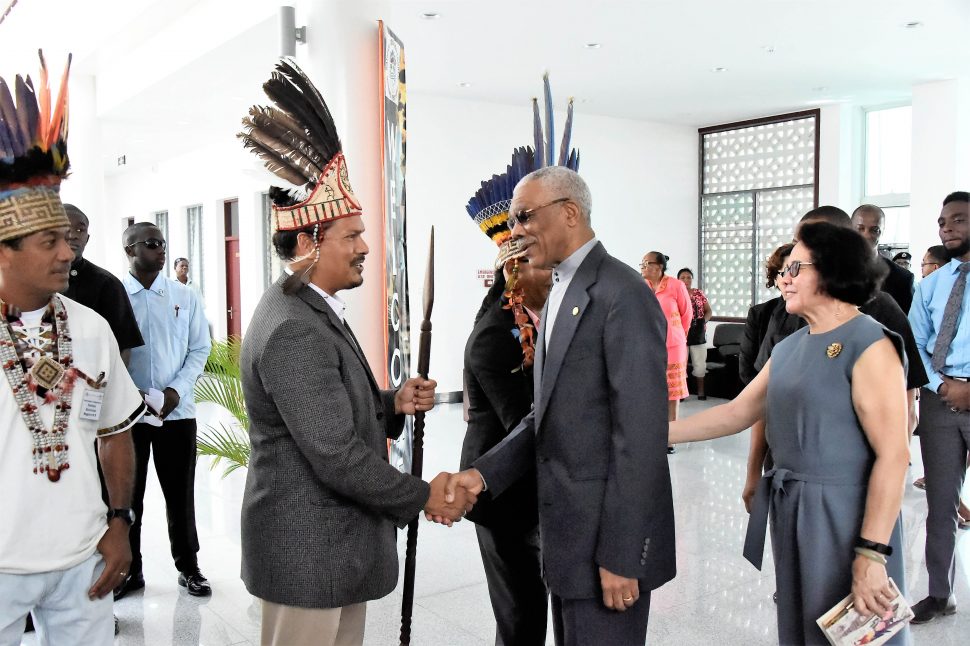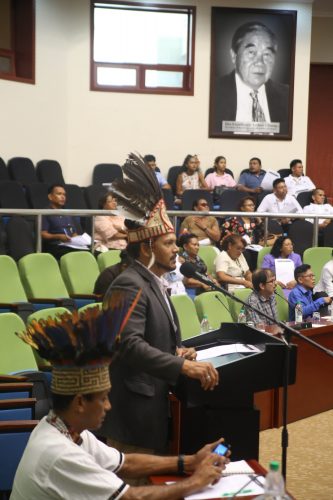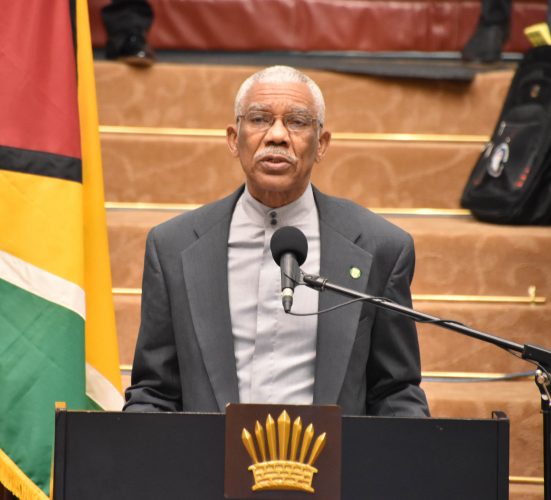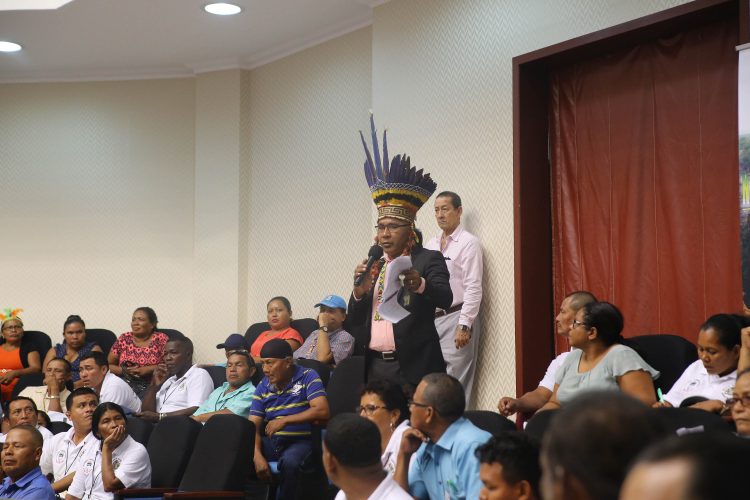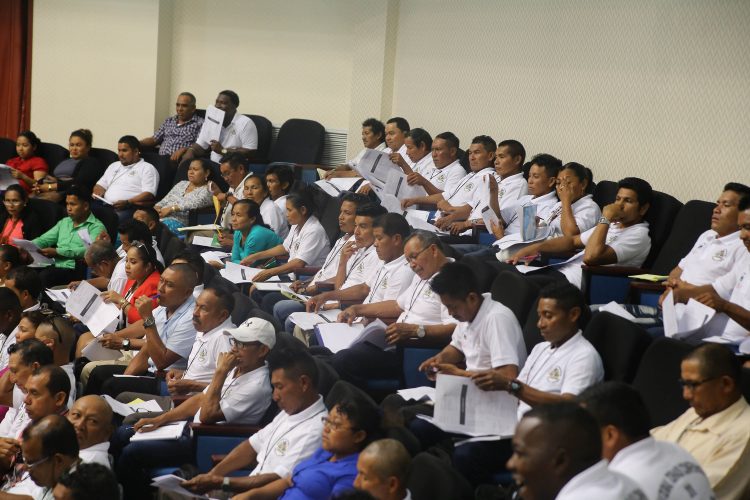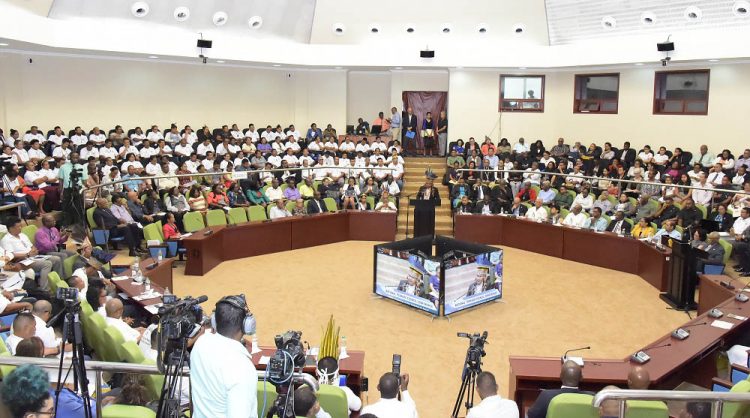President David Granger yesterday urged toshaos and other indigenous community leaders to use the annual National Toshaos Council’s conference as a vehicle for change and to deliver public services that will create more sustainable and secure livelihoods, and increased opportunities to reduce the inequalities between coastland and hinterland communities.
“This conference is about the future and not about the past. It is about planning and implementing, and creating institutions to ensure accessible, affordable and appropriate public service in all the communities,” Granger said when he delivered the main address at yesterday’s opening of the five-day 12th National Toshaos Council (NTC) Conference, at the Arthur Chung Conference Centre, at Liliendaal.
Over 176 toshaos and senior councillors were present at the opening of the conference, which is being held under the theme, “Preserving our past, Protecting our Future.”
In his address, Granger challenged the NTC to work with the village leaders to develop village improvement plans (VIPs) to provide better services in education and other social services. “The NTC is, therefore, not an ornamental body. It has work to do. It is not a political party. It is an executive arm of the State. It is vital for ensuring the progress for indigenous communities. It has to work with Central Government and the regional administration,” he stated.
The NTC, he added, “must establish suitable administration, operation and organisational structures, foster cooperation with national and regional governments and the village councils and district councils to ensure the implementation of VIPs.”
The objective of the VIPs, he said, must address as a matter of priority access to public education to ensure that every child has the opportunity to gain employment as accountants, attorneys, engineers, business people among other professions as well as being self-employed. “Every Guyanese child of every ethnicity must have the opportunity to be the best that he or she can be,” he noted.
The quality of human life is linked to the environment, Granger said, adding “It is time therefore to build environmental resilience against the threat of flooding, land degradation, reckless disposal of solid waste and the exploiting of wildlife and the pollution of waterways.”
Promises
Granger spoke after outgoing NTC Chairman Joel Fredericks lambasted government for not keeping to its promises to establish a lands commission to deal exclusively with Indigenous Peoples land issues, provision of adequate funds for the revision of “a very poor Amerindian Act,” and the granting of ownership documents of a plot of land for an NTC secretariat.
In February, 2018, Fredericks said, the NTC was promised a meeting with the President and they are still waiting to meet with him.
According to Granger, the manner in dealing with decisions emerging from the annual conferences was the establishment of the National Indigenous Peoples Authority (NIPA) which was proposed two conferences ago.
“Its non-establishment is not the fault of the Central Government,” he said, while noting that NIPA was envisaged as a body equipped with technical and managerial expertise to ensure the implementation of the decisions of the council. It was intended to deal with problems confronting Indigenous communities, he said, including the provision of public service.
Granger also said he appointed Minister of Public Affairs in the Ministry of the Presidency Dawn Hastings to assist the NTC and Indigenous communities. When she invited the leaders to meet with her on his authority, he said, they did not.
The focus of the NTC, he said, is described in the Amerindian Act and its functions include the delivery of public services particularly those related to education, economic services, energy, water, health and the environment.
No single village or toshao, he noted, can fight against poverty, ignorance, disease and crime.
While calling for the establishment of the VIPs, he said he looks forward to seeing those that will include reducing the incidence of teenage pregnancies, cancers, and communicable and vector-borne diseases such as dengue, malaria, chikungunya.
The majority of Indigenous peoples, he said, still live in the hinterland, which occupies about 70 percent of the country’s land space and was difficult to access in some areas.
He has visited, he said, over three dozen Indigenous communities to see how people live in an effort to improve public service as a means of narrowing the inequality between the hinterland and coastland. On one occasion, in the Pomeroon River, he said, First Lady Sandra Granger gave a child a book and the child said he could not read.
It was coming out of these visits, Granger said, that some 27 school buses, over a dozen boats and hundreds of bicycles are now being used to transport children to school.
Addressing land ownership documents for the plot of land “promised” for the construction of the NTC secretariat and which Fredericks said he had hoped to hand over to the new incoming NTC executive, Vice President and Minister of Indigenous Peoples’ Affairs Sydney Allicock, in his address, said that the title of the land was being processed and the transport to the land is to be handed over in the near future to give to the NTC ownership and security.
So, instead of casting “gloom and doom,” Allicock said, the NTC could have further discussions on the development of the land.
On Heritage Day in 2017, held in Pakuri, Fredericks said, the people were promised a change in the official name of the village from St Cuthbert’s Mission to Pakuri. To date “St Cuthbert’s is still St Cuthbert’s,” he said.
Addressing Granger, Fredericks said, “Promises, when said, causes us to hang our hopes on them, that we will finally find justice and that we are given an opportunity to preserve our past which will ultimately protect our future.”
Welcoming the toshaos, the majority of whom were recently elected to office, he said, that as young and new leaders, it was important for them to know of the work done by their predecessors. “I say this because most of the new toshaos, as we are already hearing, are starting to break what the outgoing council did. But remember, it takes more energy and resources to break and build, than to build on what was left,” he added.
